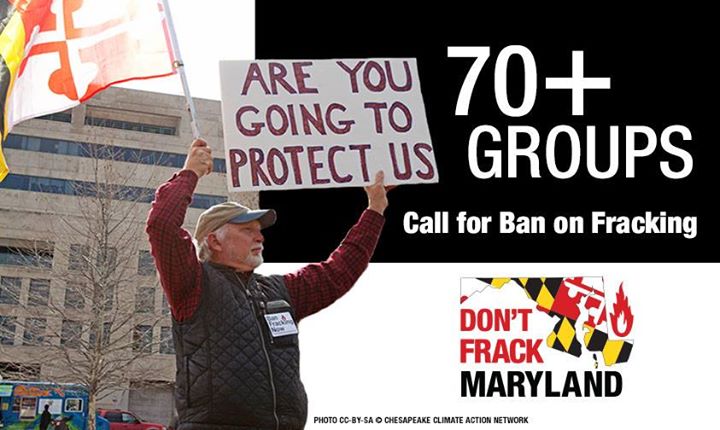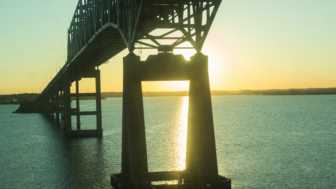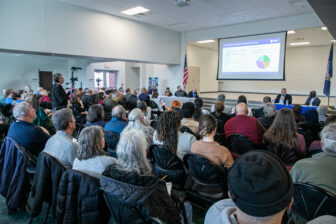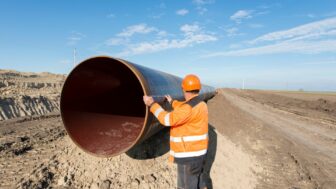Baltimore, MD—Today, 72 groups, compelled by the mounting evidence of fracking’s negative effects, announced their call for a permanent, statewide ban on fracking in Maryland to protect public health, our air, water, climate and local business interests.
The organizations include a range of environmental, health, faith, labor and business groups including Food & Water Watch, Chesapeake Climate Action Network, Maryland League of Conservation Voters, 1199SEIU United Healthcare Workers East – Maryland/DC Division, National Nurses United, Waterkeepers Chesapeake, Interfaith Power & Light, Breast Cancer Action, The Harvest Collective, and the Chesapeake Sustainable Business Council.
A full list of groups and their call for a fracking ban can be found here: http://www.dontfrackmd.org/who-we-are
“It is impossible to ignore the mounting evidence showing that fracking poses severe health threats,” said Thomas Meyer, Maryland Organizer at Food & Water Watch. “On top of that, fracking could destroy Maryland’s growing sustainable economy; everything from tourism and recreation to farms and restaurants could be devastated by fracking. A two year moratorium is a good start, but in order to truly protect Maryland’s residents and economy, a complete ban is necessary.”
“Introducing industrial-scale gas development and fracking into the mountains of western Maryland is completely incompatible with what is primarily a tourism-based economy,” said Allegany County resident Dale Sams. “Fracking requires huge volumes of water, which will have to be extracted from our rivers and streams; and our narrow country roads and small bridges will be damaged by the thousands of heavy trucks used to haul drilling equipment and toxic waste. The only way to protect western Maryland from these impacts is to ban fracking.”
As a result of a broad-based, grassroots campaign, the Maryland General Assembly passed a two-year moratorium on fracking in 2015. The law went into effect last month and will prevent any drilling activity through October 2017. The same legislation, however, requires the Hogan administration to prepare regulations for drilling. Those regulations would go into effect as soon as the moratorium expires, unless the state takes further action.
A growing body of peer-reviewed evidence finds that fracking simply cannot be done without risk to public health and the environment—and that regulations are not capable of preventing harm. A recent overview of more than 500 peer-reviewed studies by Concerned Health Professionals of New York and Physicians for Social Responsibility points to “a plethora of … harms that cannot be averted or cannot be sufficiently averted through regulatory frameworks.”
“Study after study shows that fracking quickens the march toward climate disaster,” said Shilpa Joshi, Maryland Campaign Coordinator for the Chesapeake Climate Action Network. “If we’re going to keep our coastal cities above water and keep our farms from drying out, then we must start keeping fossil fuels, including gas, in the ground. Maryland can lead the way by banning fracking permanently and focusing 100% on clean energy solutions that protect our health and climate while creating good-paying jobs. ”
“Marylanders’ livelihoods and health depend on pure water, healthy soil, and clean air and would be forever damaged if hydraulic fracturing is allowed in Western Maryland,” said Waterkeepers Chesapeake Executive Director Betsy Nicholas. “There are already too many instances of how this highly industrial, polluting process of fracking has had dramatic and irreversible negative impacts on local water resources in states like Pennsylvania and West Virginia.”
Concerns over the long-term health impacts of fracking continue to mount. Last month, a study led by researchers at John’s Hopkins Bloomberg School of Public Health found an association between a mother’s exposure to drilling and fracking activity during pregnancy and birth outcomes. The study found that the likelihood of preterm births were 40 percent higher among women living in areas with the most intense drilling and fracking operations compared to women with the lowest exposure level. Women living in heavy drilling areas during pregnancy were also more likely to have high-risk pregnancies, as reported by their healthcare provider.
“Viable alternatives to fracking are undeniably much more in the public’s interest and safer for human health and our environment,“ said Stephen Shaff, Executive Director of the Chesapeake Sustainable Business Council. “From a business perspective, clean energy is where the greatest opportunities exist. Fracking is a boom and bust industry, and allowing this sort of destructive energy practice could damage truly sustainable economic development, while benefitting only a few.”
“We see no evidence that drilling for shale gas can be effectively regulated,” said Paul Roberts, Board President of Citizen Shale. “As the state’s longest-standing community organization seeking protections from the industry’s impacts, we find that a growing body of data strongly suggests fracking is dangerous to humans and the environment. Furthermore, it remains unknown whether fracking can provide economic benefits to the majority of local citizens or to the state. We look forward to completion of a fair and impartial analysis, funded by the county and federal government, of fracking’s potential affects on western Maryland’s tourism-based economy.”
“As a young farmer in western Maryland, I would inherit incredible suffering if fracking were permitted,” said Kim Alexander, Garrett County resident and member of The Harvest Collective. “Fracking would fracture our farms with toxic chemicals, fill the air with cancerous fumes, and permanently destroy our water. Maryland must ban fracking so we can continue to provide clean food, water, and sustainable energy solutions.”
“In addition to threatening the health and safety of Marylanders, fracking would also require more pipelines and compressor stations, which would bring yet more hazards to communities and tie us to fracked gas for at least 50 years,” said Elisabeth Hoffman, representing Howard County Climate Change. “We don’t have the luxury of time to avert climate chaos—we must act now. Maryland should ban fracking and move as quickly as possible away from dirty fossil fuels and toward clean energy and conservation.”
Contacts:
Shilpa Joshi, 240-396-2029, shilpa@chesapeakeclimate.org
Kelly Trout, 240-396-2022, kelly@chesapeakeclimate.org
###






